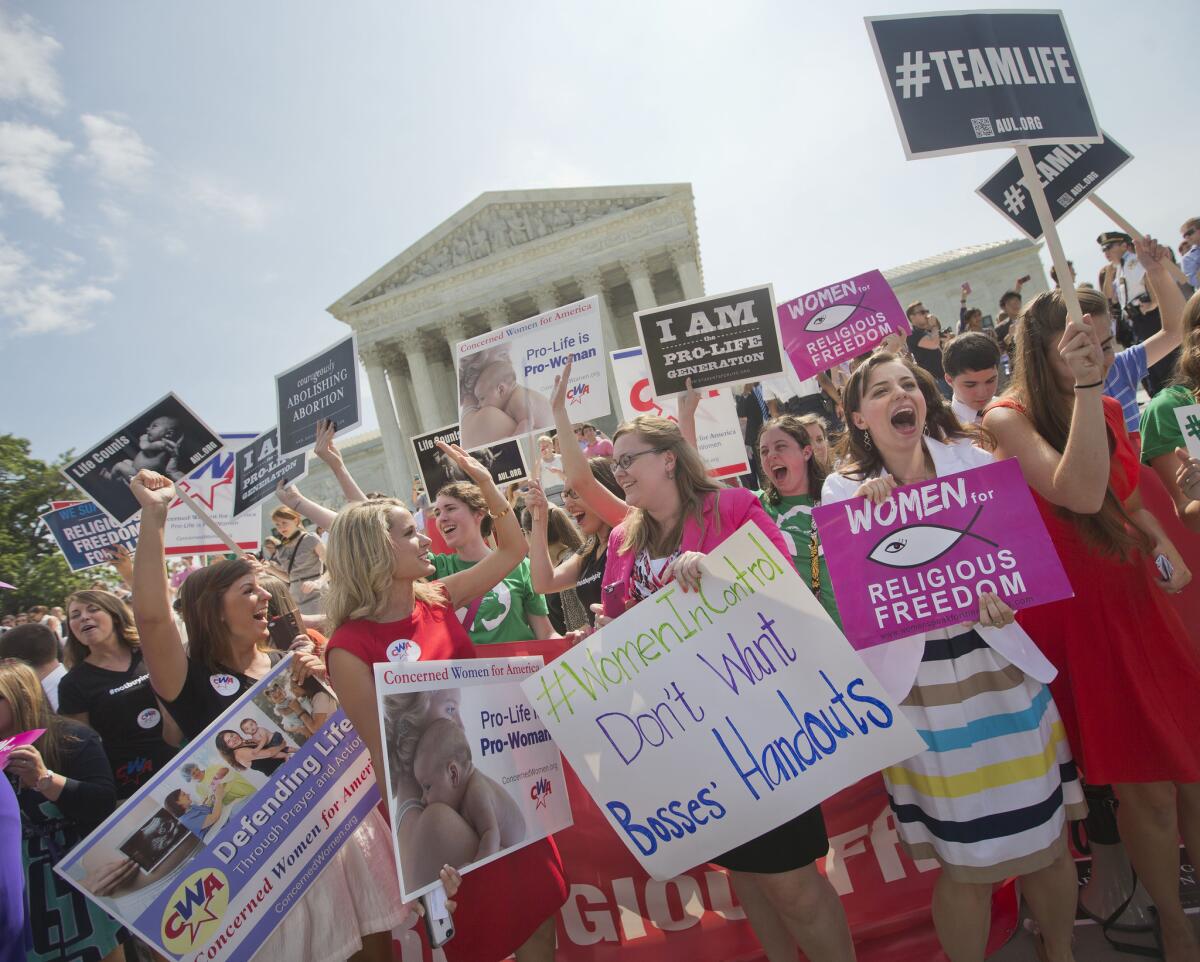Supreme Court OKs another religious birth control exemption

- Share via
Reporting from Washington — A divided Supreme Court gave a small Christian college in Illinois a temporary exemption Thursday from the “contraceptive mandate” in President Obama’s healthcare law, renewing questions about how the justices will handle religious requests to opt out of the rule.
On Monday, in its decision in the Hobby Lobby case, the court approved religious exemptions for companies whose owners have religious objections to certain forms of contraception. In their opinions, the justices spoke approvingly of a compromise position the administration had previously adopted that is designed to shield religiously affiliated nonprofit employers from paying directly for contraceptives.
The language in Monday’s decision appeared to signal that the court would uphold the administration’s compromise, which has been challenged by dozens of religious colleges and charities.
But in Thursday’s order, the court granted Wheaton College, an evangelical Protestant liberal arts school west of Chicago, a temporary injunction allowing it to continue to not comply with the compromise rule.
The college, whose mission statement says it “serves Jesus Christ and advances His Kingdom through excellence in liberal arts and graduate programs,” says its religious precepts forbid it from paying for so-called morning-after pills.
College officials refused even to sign a government form noting their religious objection, saying that to do so would allow the school’s insurance carrier to provide the coverage on its own.
The court’s order means that for now, the school’s students and faculty and their dependents will not be able to use the college’s health plan to pay for those contraceptives.
The unsigned order prompted a sharply worded dissent from the court’s three female members, Justices Sonia Sotomayor, Ruth Bader Ginsburg and Elena Kagan.
“I disagree strongly with what the court has done,” Sotomayor wrote in a 16-page dissent. Noting that the court had praised the administration’s position on Monday but was allowing Wheaton to flout it on Thursday, she wrote, “those who are bound by our decisions usually believe they can take us at our word. Not so today.”
“I have deep respect for religious faith, for the important and selfless work performed by religious organizations and for the values of pluralism” protected by the Constitution, the dissent added. “But the Court’s grant of an injunction in this case allows Wheaton’s beliefs about the effect of its actions to trump the democratic interest in allowing the Government to enforce the law.”
The administration’s existing accommodation for church-related employers was worked out last year and was intended to take effect on Jan. 1. Under the plan, religiously affiliated nonprofits that object to covering some or all contraceptives for employees are supposed to file a form certifying their objection. After that, their insurance carriers will step in to provide the coverage at no added cost. Insurers have been willing to go along with that idea on the belief that the cost of paying for contraceptives is offset by the savings from not having to pay for pregnancies.
Some religious groups have accepted that plan. Others have gone to court to try to block it. Lower courts have been divided over what to do. The Supreme Court seems increasingly likely to have to resolve the issue, perhaps next year.
In the interim, the court has faced a series of emergency appeals from religious entities seeking temporary exemptions. Though many lower courts have granted the requests, the 7th Circuit Court of Appeals in Chicago has turned down several, including one from Wheaton.
In Thursday’s order, the court said Wheaton need not comply in any way with the law while its appeal was pending.
“Nothing in this order precludes the Government from relying on this notice … to facilitate the provision of full contraceptive coverage under the Act. In light of the foregoing, this order should not be seen as an expression of the Court’s views on the merits,” it wrote.
On Twitter @DavidGSavage
More to Read
Sign up for Essential California
The most important California stories and recommendations in your inbox every morning.
You may occasionally receive promotional content from the Los Angeles Times.











